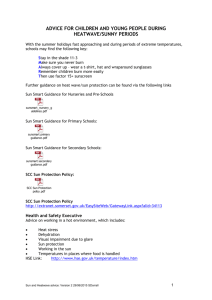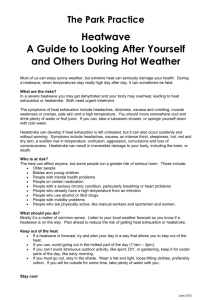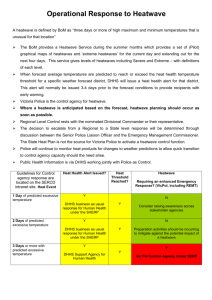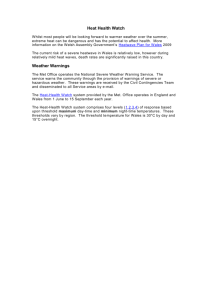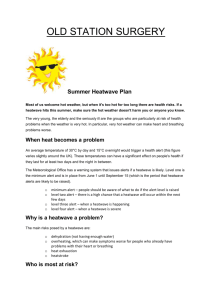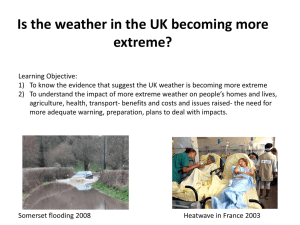Heatwave advice for parents
advertisement
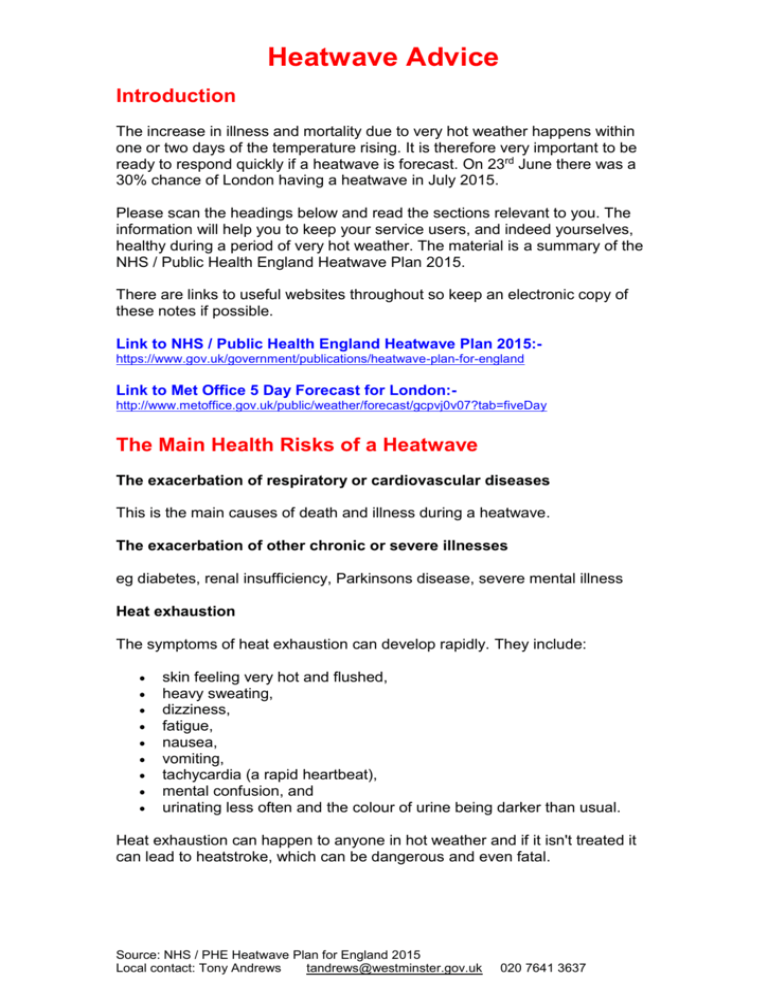
Heatwave Advice Introduction The increase in illness and mortality due to very hot weather happens within one or two days of the temperature rising. It is therefore very important to be ready to respond quickly if a heatwave is forecast. On 23rd June there was a 30% chance of London having a heatwave in July 2015. Please scan the headings below and read the sections relevant to you. The information will help you to keep your service users, and indeed yourselves, healthy during a period of very hot weather. The material is a summary of the NHS / Public Health England Heatwave Plan 2015. There are links to useful websites throughout so keep an electronic copy of these notes if possible. Link to NHS / Public Health England Heatwave Plan 2015:https://www.gov.uk/government/publications/heatwave-plan-for-england Link to Met Office 5 Day Forecast for London:http://www.metoffice.gov.uk/public/weather/forecast/gcpvj0v07?tab=fiveDay The Main Health Risks of a Heatwave The exacerbation of respiratory or cardiovascular diseases This is the main causes of death and illness during a heatwave. The exacerbation of other chronic or severe illnesses eg diabetes, renal insufficiency, Parkinsons disease, severe mental illness Heat exhaustion The symptoms of heat exhaustion can develop rapidly. They include: skin feeling very hot and flushed, heavy sweating, dizziness, fatigue, nausea, vomiting, tachycardia (a rapid heartbeat), mental confusion, and urinating less often and the colour of urine being darker than usual. Heat exhaustion can happen to anyone in hot weather and if it isn't treated it can lead to heatstroke, which can be dangerous and even fatal. Source: NHS / PHE Heatwave Plan for England 2015 Local contact: Tony Andrews tandrews@westminster.gov.uk 020 7641 3637 Heatwave Advice Main Health Risks ctd Heatstroke The symptoms of classic heatstroke can develop over several days if you are spending a long time somewhere hot. The symptoms of exertional heatstroke can appear more quickly, usually after physical activity. Symptoms of heatstroke include: high body temperature: having a temperature of 40°C (104°F) or above is a major sign of heatstroke, heavy sweating that suddenly stops: if the body is unable to produce any more sweat then this is a big warning sign that the body has become over-heated and dehydrated, tachycardia (a rapid heartbeat), hyperventilation (rapid breathing), and muscle cramps. The extreme heat that causes heatstroke also affects the nervous system, which in turn can cause other symptoms such as: mental confusion, lack of co-ordination, seizures (fits), restlessness or anxiety, problems understanding or speaking to others, hallucinations (seeing or hearing things that are not real), loss of consciousness. Heatstroke is a medical emergency. Dial 999 immediately and ask for an ambulance. If you or anyone else feels unwell, drink water and go somewhere cool to rest. If symptoms such as breathlessness, chest pain, confusion, dizziness, weakness or cramps get worse or don't go away, seek medical help For more details of health effects see Chapter 1 of the “Making the Case” paper accompanying the Heatwave Plan for England:https://www.gov.uk/government/uploads/system/uploads/attachment_data/file/310604/100882902328-TSO-Heatwave-Making_the_Case_ACCESSIBLE.pdf Source: NHS / PHE Heatwave Plan for England 2015 Local contact: Tony Andrews tandrews@westminster.gov.uk 020 7641 3637 Heatwave Advice High Risk Groups Identifying the people most at risk of suffering serious ill effects of a heatwave is one of the most important actions. Please prepare to identify those people, perhaps at short notice. High temperatures can be dangerous within one or two days, especially for: the elderly infants people with chronic or long-term medical conditions particularly those with respiratory or cardiovascular diseases (the main causes of death and illness during a heatwave) homeless people people with alcohol or drug dependence People who cannot adapt their behaviour to keep cool (dementia or immobility are factors here) People who live in “Urban Heat Islands” See Chapter 3 of “Making the Case” for an explanation. (see above link) People living in top floor, South facing flats NB: In an extreme, prolonged heatwave fit and active people can also be affected For more details of high risk groups see Chapter 1 of the “Making the Case”:https://www.gov.uk/government/uploads/system/uploads/attachment_data/file/310604/100882902328-TSO-Heatwave-Making_the_Case_ACCESSIBLE.pdf Generic Advice for All Staff and Service Users This advice has been phrased for staff visiting vulnerable people in their own homes but much of it is relevant for other settings and indeed for staff themselves. Advance preparations: Help your service users to: Stay tuned to the weather forecast on the TV or radio. Here is a useful Met Office site:http://www.metoffice.gov.uk/public/weather/forecast/london?tab=fiveDay Stock up with supplies of medicines, food and non-alcoholic drinks to avoid having to go out in the heat Keep plenty of water to hand and stay in the shade whenever possible. Identify the coolest room in the house, so they can go there to keep cool. Source: NHS / PHE Heatwave Plan for England 2015 Local contact: Tony Andrews tandrews@westminster.gov.uk 020 7641 3637 Heatwave Advice Advance preparations ctd: Check the practicality of shading and/or opening windows Monitor temperatures frequently, prepare cool areas (below 26° C), Ensure access to water and ice, If temperatures become very high: Identify your high risk service users (see the High Risk Groups above, including people with heart problems, breathing difficulties or serious illnesses). Ensure high risk people are visited or telephoned daily to check how they are coping with the heat. Encourage and assist them to:- Drink water or fruit juice regularly. Change from hot to cold food with high water content (fruit and salads) Avoid tea, coffee and alcohol, and if they do drink alcohol make sure they have lots of water or other non-alcoholic drinks as well. Wear loose cotton clothing Keep rooms cool by using shade or reflective material external to the glass, or if that is not possible, by closing light-coloured curtains (metallic blinds and dark curtains can make the room hotter). Close windows and curtains while the room is cooler than outside and, if it's safe, open windows at night when the air outside is cooler. Avoid going outside in the hottest part of the day (11am to 3pm). If they do need to travel, to carry water with them (it is best to drink 15 minutes before travelling). Spend time in the shade and avoid strenuous activity. Splash their faces and the backs of their necks with cool water. People with heart problems, breathing difficulties or serious illnesses may find their symptoms become worse in hot weather, so make sure they have enough medicines in stock and take extra care to keep cool. Review the frequency of visits Help others: check on neighbours, relatives and friends who are less able to look after themselves (eg, if they have mobility problems). If you’re planning to travel, check the forecast at your destination too and see the tips below from TfL. Take sensible precautions to prevent sunburn, particularly in children See the HPA/PHE Sunsense Guide:https://www.phe-protectionservices.org.uk/cms/assets/gfx/pheradon/animations/ataglance/content/sunsense.swf See the NHS Heatwave Advice to the Public and if possible give it to your service users:https://www.gov.uk/government/uploads/system/uploads/attachment_data/file/310608 /10091-2902332-TSO-Looking_after_yourself_ACCESSIBLE.pdf See the NHS / PHE Advice for Health and Social Care Professionals:https://www.gov.uk/government/uploads/system/uploads/attachment_data/file/310605/10 089-2902329-TSO-Heatwave-Advice_for_Health_Professionals_ACCESSIBLE.pdf Source: NHS / PHE Heatwave Plan for England 2015 Local contact: Tony Andrews tandrews@westminster.gov.uk 020 7641 3637 Heatwave Advice Transport for London Tips to keep cool Carry water with you (It is best to drink 15 minutes before travelling) Don't board a train or bus if you feel unwell If you feel unwell please get off at the next stop and seek help from our staff Avoid pulling the passenger alarm between stations Advice for people looking after children (schools, early years settings, youth clubs and play schemes) The generic advice for all staff and service users above will be helpful for you but the following specifically relates to children:Children who may be more at risk could be those who are: Overweight Under 4 years old Taking medication With disabilities or complex health needs Ask the school nurse to advise which children are at risk as the above is a very simplified indication of risk factors. See Chapter 3.3 of the Heatwave Plan for England 2014:https://www.gov.uk/government/uploads/system/uploads/attachment_data/file/310598/100872902315-TSO-Heatwave_Main_Plan_ACCESSIBLE.pdf For practical advice see the PHE Heatwave Guidance for schools and early years settings: http://webarchive.nationalarchives.gov.uk/20140714084352/http:/www.hpa.org.uk/Topics/Em ergencyResponse/ExtremeWeatherEventsAndNaturalDisasters/Heatwaves/heatwaves_teach ers/ Action Tables (All managers) Recommended: The action tables in the NHS Heatwave Plan, Chapter 3 and in the Annexes of NHS Advice for health and social care professionals provide a very helpful summary of actions for managers in various settings:https://www.gov.uk/government/uploads/system/uploads/attachment_data/file/310598/100872902315-TSO-Heatwave_Main_Plan_ACCESSIBLE.pdf https://www.gov.uk/government/uploads/system/uploads/attachment_data/file/310605/100892902329-TSO-Heatwave-Advice_for_Health_Professionals_ACCESSIBLE.pdf Source: NHS / PHE Heatwave Plan for England 2015 Local contact: Tony Andrews tandrews@westminster.gov.uk 020 7641 3637 Heatwave Advice Advice for Managers of Care Homes Identify the high risk residents Increase staff awareness of heat related illness. Care homes should monitor temperatures frequently. Install thermometers Prepare cool areas (below 26° C), Check that windows can be shaded (ideally externally) and opened (security permitting) Ensure access to water and ice, Consider changing menus to cold food with high water content (fruit and salads) Check supply of fans (NB; see caution on fans on p 7 of Advice to Care Home managers below) Review staffing levels See the Heatwave Plan Advice for Care Home Managers and Staff:https://www.gov.uk/government/uploads/system/uploads/attachment_data/file/310606/100902902330-TSO-Heatwave-Care_Home_Managers_ACCESSIBLE.pdf Heat Health Advice during Ramadan In 2015 Ramadan starts on Thursday 18th June. See p31 of the NHS Heatwave Plan:https://www.gov.uk/government/uploads/system/uploads/attachment_data/file/201039/Heatwa ve-Main_Plan-2013.pdf Advice for Event Organisers See Annexe 3 of the NHS Heatwave Plan https://www.gov.uk/government/uploads/system/uploads/attachment_data/file/201039/ Heatwave-Main_Plan-2013.pdf See also the HSE advice for event organisers:http://www.qub.ac.uk/safetyreps/sr_webpages/safety_downloads/event_safety_guide.pdf Alert Levels and Met Office Heat Health Alert Service Chapter 2 of the NHS Heatwave Plan explains the Alert Levels:https://www.gov.uk/government/uploads/system/uploads/attachment_data/file/429384/ Heatwave_Main_Plan_2015.pdf Source: NHS / PHE Heatwave Plan for England 2015 Local contact: Tony Andrews tandrews@westminster.gov.uk 020 7641 3637
